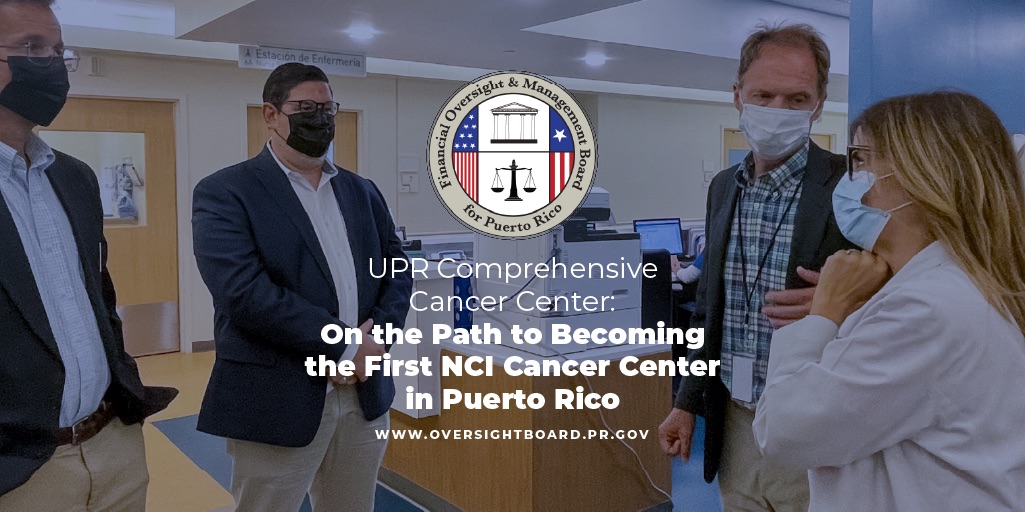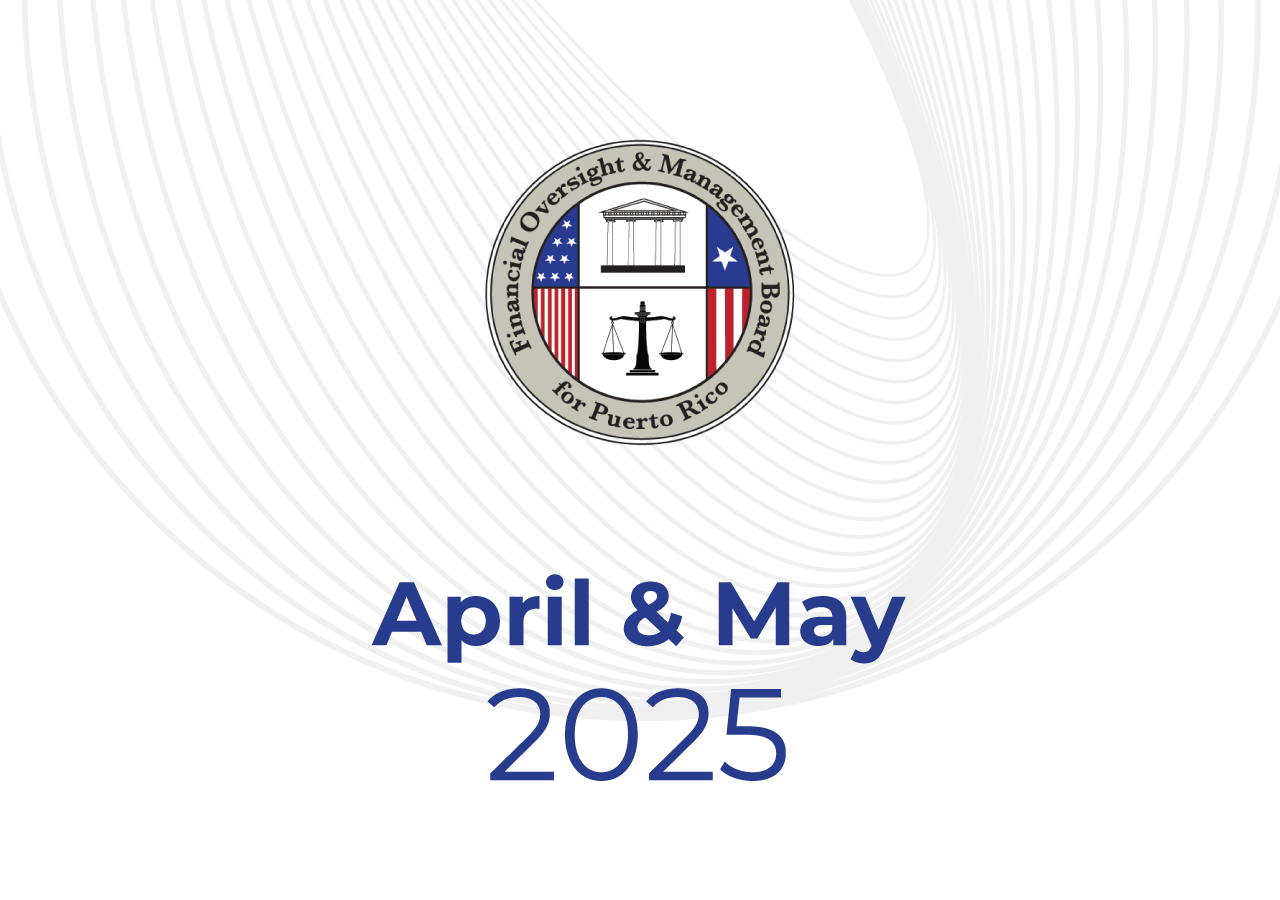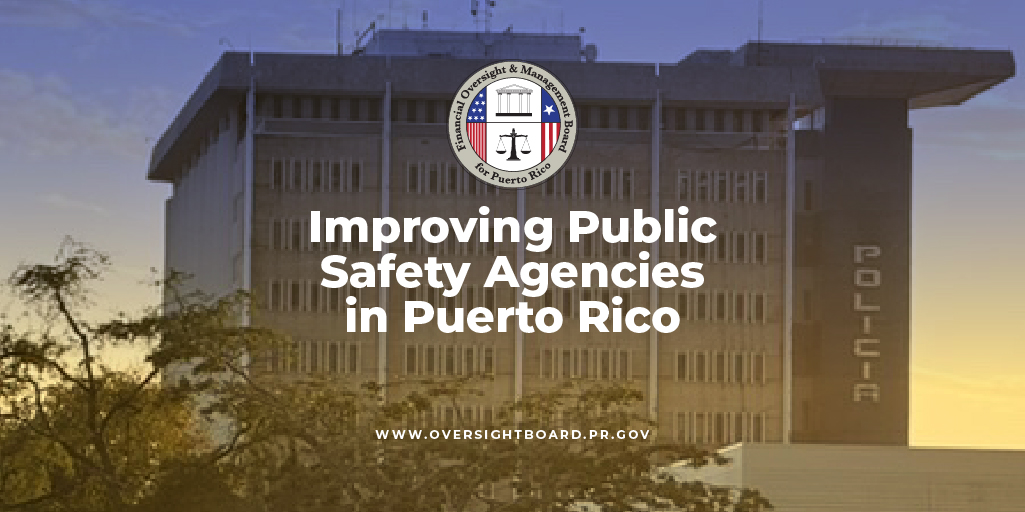A quality health care system is a crucial element of economic success. That is why the Fiscal Plans anad budgets the Oversight Board has certified since PROMESA was enacted included significant investments, over $400 million, in health. The certified budget for fiscal year 2024 includes more than $100 million for new investments ranging from structural improvements for urgent care clinics to the purchase of medical equipment and the installation of air conditioning and purification systems.
The University of Puerto Rico’s Comprehensive Cancer Center has been one focus of the Fiscal Plan investments. Oversight Board Chairman David Skeel and board members Antonio Medina and Andrew Biggs recently visited the Cancer Center to discuss the Cancer Center’s progress.
The Cancer Center opened in 2018. The costs for building and operating the Cancer Center have been provided by the Puerto Rico Government’s general fund budget since 2004. Most recently, law 106-2015 required funding of $10 million a year from fiscal year 2017 to 2020. Since 2021, the Oversight Board certified Fiscal Plan continued the $10 million a year funding with the requirement for the Cancer Center to become self-sustainable by fiscal year 2024.
The Fiscal Plan also provides the Cancer Center over the next seven years with an additional $10 million a year to recruit scientists and physician scientists for research. In total, the Oversight Board approved over $50 million for major projects at the Cancer Center since 2020, including funding for specialized medical equipment to help the Cancer Center to perform more surgeries. The business plan prepared by the Cancer Center and required by the Fiscal Plan outlines the Cancer Center’s goal to perform more surgeries by also opening two new operating rooms. The fiscal year 2024 budget the Oversight Board certified in June includes $3.5 million to purchase the necessary equipment to open these operating rooms.
In fiscal year 2023, which ended on June 30, 2023, the Cancer Center reached two milestones: developing a campaign to promote the early detection of cancer and the health services offered at the hospital, and successfully implementing phase 1 of a new electronic health records (EHR) system required by Medicare and Medicaid Services (CMS) and health insurance providers. EHR allows the Cancer Center to bill health insurance providers in a timely manner, reduce billing errors, and increase collections.
The Cancer Center is also working towards obtaining the National Cancer Institute’s Designated Cancer Center designation, a recognition that has been granted to 72 medical centers in 36 states and the District of Columbia. NCI Cancer Centers receive federal funding to provide cutting-edge treatments to cancer patients, while allowing the centers to generate revenue through cancer research and grants.
Obtaining the formal federal designation would not only be a great achievement for the Cancer Center and Puerto Rico, but it would also bring the Cancer Center closer to fund itself with insurance payments rather than government subsidies. According to the Cancer Center’s Executive Director Dr. Marcia Cruz-Correa, some hospitals with NCI designation can cover up to 70% of the costs of the services they provide to patients with the money that is generated through research. One of the Cancer Center’s main programs, the Radiotherapy Center, is already generating millions of dollars annually in revenue.
In October of 2022, the Cancer Center started using its da Vinci Xi surgical robot, which was purchased with $2.6 million provided by the Fiscal Plan. With this device surgeons can perform complex procedures with greater precision through minimally invasive surgeries. This not only allows the specialists to remove cancers from hard-to-reach areas of the body, but also causes less damage to surrounding tissue and has a significant impact on the time and ease of recovery for the patients. Already, more than 200 oncological procedures have been performed using the device, and the utilization of the robot is over 90%.
“It was the Financial Oversight and Management Board that actually assigned the funds [to buy the da Vinci Xi]. It was a dream. We showed why this was important and it was done,” Dr. Cruz-Correa said. The Oversight Board fiscal year 2024 budget approved $3.9 million for the purchase of a second da Vinci.
“I had surgery in February at MD Anderson [Cancer Center]” in Texas, said Oversight Board Member Medina. “It is necessary to have the right equipment like the da Vinci to do those kinds of surgeries without creating damage to the surrounding areas so you can get back to normal. I hope that if I ever need another surgery, I don’t have to leave Puerto Rico.”
Several hospitals own a surgical robot, but the Cancer Center is the only medical facility in Puerto Rico where medical residents can train on the device. Medical students no longer need to leave Puerto Rico to become specialized in the use of the surgical robots, said Dr. William Mendez, the Cancer Center’s Chair of Surgery. Training the medical residents is also essential to helping maintain accreditation for specific medical residencies at the UPR Medical Sciences Campus.
Once the Cancer Center becomes NCI accredited and gains access to the studies, administrators hope to enroll as many patients as possible in NCI-supported clinical trials. The patients that participate would receive their medications for free, reducing how much money the Center spends on medication.









